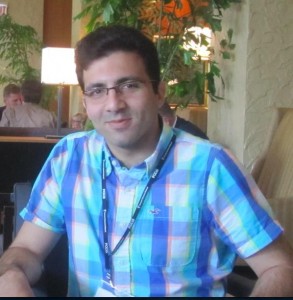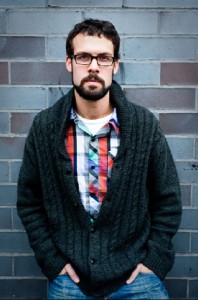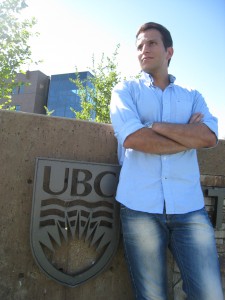The UBC Faculty of Medicine has named three graduate students as recipients of the Constance Livingstone-Friedman and Sydney Friedman Foundation Scholarships in Health Sciences. Mohsen Khosravi Maharlooei, Ben Paylor and Hojatollah Rezaei Nejad will share a total of $100,000 to undertake learning opportunities in the health sciences under the supervision of international experts.
Created in 2013 by a generous pledge from the Constance Livingstone-Friedman and Sydney Friedman Foundation, the Friedman Scholars Program aims to provide graduate students and UBC medical resident trainees the opportunity to make a considerable difference in the field of Health Sciences. Health Sciences is interpreted broadly to include complementary work being done in other disciplines related to the promotion and dissemination of health related education or research.
Named for the first two faculty members in the UBC Faculty of Medicine, Drs. Constance and Sydney Friedman believed that a well-rounded education requires students to learn from different perspectives and cultures. Friedman Scholars are expected to travel outside of Western Canada and engage with global experts in their respective fields for a minimum period of 6 months.
The 2014 Friedman Scholars will begin their scholarships in late 2014.

Mohsen Khosravi Maharlooei
Mohsen Khosravi Maharlooei
“One of the most challenging areas of modern medicine is the replacement of failed organs in human beings,” says Dr. Mohsen Khosravi Maharlooei. Over the past year, Khosravi Maharlooei has studied immune rejection as the main challenge of organ and cell transplantation. Under the supervision of Dr. Aziz Ghahary, Director of the British Columbia Professional Firefighters’ Burn and Would Healing Laboratory, Khosravi Maharlooei has tested novel approaches for inducing immune tolerance in two different settings of transplantation.
The Friedman Scholars Program will allow Khosravi Maharlooei to study for one year at the Duke University School of Medicine and Columbia Center for Translational Immunology. At Duke and Columbia, he will further his research on immune tolerance and rejection under the guidance of Dr. M. Louise Markert and Dr. Megan Sykes. Markert is currently the only doctor in North America performing thymus transplantation, a procedure she pioneered in the late 1990s. Sykes is an internationally recognized leader in the field of transplantation biology and the current director of the Columbia Center for Translational Immunology.
Khosravi Maharlooei began his doctoral studies in the Experimental Medicine program in April 2013. He is originally from Shiraz, Iran.

Ben Paylor
Ben Paylor
While his formal doctoral research focuses on developing strategies to augment cardiac regenerative processes following injury, Friedman Scholar Ben Paylor has dedicated his time outside of the lab to a variety of communication-, education- and policy-oriented projects that bridge the gap between society and the laboratory.
“The role of today’s scientists in helping provide cogent and accessible explanations of emerging scientific technologies, their impact, and their value cannot be overstated” says Paylor.
As a recipient of a Constance Livingstone-Friedman and Sydney Friedman Foundation Scholarship in Health Sciences, Paylor will embark on an ambitious knowledge translation project at the Stanford University Center for Biomedical Ethics under the supervision of Dr. Christopher Thomas Scott. At Stanford, Paylor will further develop his understanding of biomedical ethics through coursework and mentorship, produce a series of animated shorts about patient understanding of the clinical trial process, then analyze the impact of these animated videos on patient understanding using qualitative and quantitative methods.
Paylor began his doctoral studies in the Experimental Medicine program in January 2010 under the supervision of Dr. Fabio Rossi. He is originally from Mississauga, Ontario.

Hojatollah Rezaei Nejad
Hojatollah Rezaei Nejad
Tissue engineering represents an important potential alternative or complementary solution to tissue and organ failure, which now accounts for almost half of the total annual expenditure in health care in the US. A major goal of the field is to determine how the physical organization and composition of cells affects function at the level of tissue, organ, or the entire organism.
“This remains a challenging goal because direct and general methods for controlling the relative spatial position of cells in tissues and organs do not exist,” explains Hojatollah Rezaei Nejad.
For the past two years, Rezaei Nejad has addressed this challenge head-on under the supervision of Dr. Mina Hoorfar in the Advanced Thermo-Fluidic Laboratory at UBC Okanagan. His doctoral research involves capturing bioparticles, such as cells, in lab-on-a-chip devices in the range of micrometers.
As a Friedman Scholar, Rezaei Nejad will take his research to the next level by applying his innovative cell printing method to tissue engineering. Rezaei Nejad will spend the next year with the Dr. Ali Khademhosseini lab group at the Harvard-MIT Division of Health Sciences and Technology. Dr. Khademhosseini is a leader in the field of biomedical tissue engineering whose research focuses on the development of micro- and nano-scale technologies to control cell behaviour.
Rezaei Nejad started his doctoral studies in January 2012 in the UBCO School of Engineering, Faculty of Applied Science. He is from Shiraz, Iran.